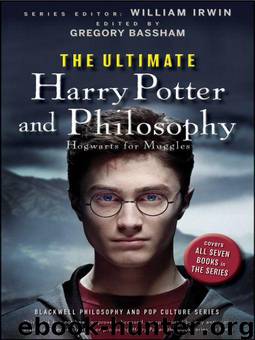The Ultimate Harry Potter and Philosophy: Hogwarts for Muggles by William Irwin; Gregory Bassham

Author:William Irwin; Gregory Bassham
Language: eng
Format: mobi
Tags: Irish, Philosophy in literature, Social Science, Science Fiction & Fantasy, Welsh, Hogwarts School of Witchcraft and Wizardry (Imaginary organization), Philosophy, Potter, Children's Literature, General, Literary Criticism, Scottish, Harry (Fictitious character), Popular Culture, English, European
ISBN: 9780470398258
Publisher: John Wiley and Sons
Published: 2010-09-21T10:00:00+00:00
PART FOUR
THE ROOM OF REQUIREMENT: A POTTER POTPOURRI
10
IS DUMBLEDORE GAY? WHO’S TO SAY?
Tamar Szabó Gendler
On October 19, 2007, before a packed audience at Carnegie Hall in New York City, J. K. Rowling made a remarkable announcement. In response to a question about whether Albus Dumbledore had ever been in love, Rowling announced that she had “always thought of Dumbledore as gay.”
Reaction was immediate and emphatic. Within two days, close to 3,000 comments had been posted at the Leaky Cauldron message board, with another 2,500 at MuggleNet. There were articles in Time and Newsweek, reports on CNN and NBC, and even an op-ed piece in the New York Times.
Responses fell into three categories. Some readers were delighted by the news. As one Leaky Cauldron poster wrote, “You go Jo! Finally a strong, wise, non-stereotypical portrayal of a gay man!”1 A second group was dismayed. “I am extremely disappointed at Jo for her comments on Dumbledore. It was not necessary for her to promote such a perverse lifestyle in connection to a series of books that millions of children will take interest in now and in the future,” wrote another.2 But the most interesting type of response was the third. These readers responded to the declaration by challenging Rowling’s authorial authority. “Unless she decides to write Book Eight, Ms. Rowling has missed her chance to impart any new information about any of the Harry Potter characters. If the series is truly at an end, then the author no longer possesses the authority to create new thoughts, feelings, and realities for those characters,” wrote one reader.3 “To insist on ownership (as she has done) and the right to define or re-define those characters as she sees fit after the fact, is to insist on an absolute control over the literary experience of her readers she cannot possibly have,” wrote another.4
On its surface, this third response is perplexing. After all, at the Carnegie Hall interview, Rowling revealed all sorts of things that are not explicitly part of the Harry Potter stories. She told the audience about things that happened after the Potter books end, about things that happened before the books begin, and about things that happen during the books. But no one wrote in to comment that Neville Longbottom didn’t go on to marry Hannah Abbott or that Remus Lupin, prior to Dumbledore taking him in, didn’t lead “a really impoverished life because no one wanted to employ a werewolf ” or that Petunia Dursley didn’t “almost wish Harry luck when she said good-bye to him” at the beginning of Deathly Hallows—all of which were things that Rowling revealed only in the course of the interview.
What we face here is a version of what philosophers call the problem of truth in fiction.5 Are there facts about what is true in the world of a story, and if so, what determines those facts? Is it simply a matter of the statements that are canonically expressed by the story’s author? What role is played by
Download
This site does not store any files on its server. We only index and link to content provided by other sites. Please contact the content providers to delete copyright contents if any and email us, we'll remove relevant links or contents immediately.
| Books & Reading | Comparative Literature |
| Criticism & Theory | Genres & Styles |
| Movements & Periods | Reference |
| Regional & Cultural | Women Authors |
4 3 2 1: A Novel by Paul Auster(11795)
The handmaid's tale by Margaret Atwood(7457)
Giovanni's Room by James Baldwin(6814)
Big Magic: Creative Living Beyond Fear by Elizabeth Gilbert(5359)
Asking the Right Questions: A Guide to Critical Thinking by M. Neil Browne & Stuart M. Keeley(5358)
Ego Is the Enemy by Ryan Holiday(4960)
On Writing A Memoir of the Craft by Stephen King(4667)
The Body: A Guide for Occupants by Bill Bryson(4588)
Ken Follett - World without end by Ken Follett(4448)
Bluets by Maggie Nelson(4265)
Adulting by Kelly Williams Brown(4237)
Eat That Frog! by Brian Tracy(4153)
Guilty Pleasures by Laurell K Hamilton(4121)
White Noise - A Novel by Don DeLillo(3833)
The Poetry of Pablo Neruda by Pablo Neruda(3820)
Fingerprints of the Gods by Graham Hancock(3740)
Alive: The Story of the Andes Survivors by Piers Paul Read(3734)
The Book of Joy by Dalai Lama(3700)
The Bookshop by Penelope Fitzgerald(3621)
